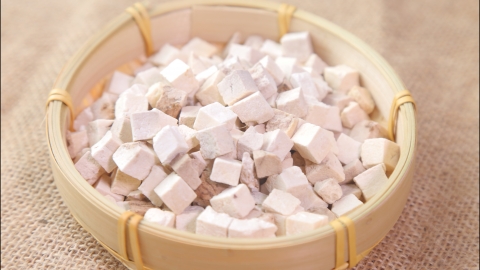What are the side effects and contraindications of Poria (Fu Ling)?
Fuling (Poria) may generally cause side effects such as gastrointestinal discomfort, allergic reactions, frequent urination, blood glucose fluctuations, and worsening of yin deficiency symptoms. Contraindications typically include:禁use in individuals with excessive internal heat due to yin deficiency, caution in those with sinking qi, kidney deficiency with frequent urination, diabetic patients, and avoidance of concurrent use with certain medications. Detailed analysis is as follows:

I. Side Effects
1. Gastrointestinal Discomfort: Excessive intake of Poria or its use by individuals with weak spleen and stomach function may lead to bloating, diarrhea, nausea, and other discomforts. This is because Poria has a diuretic and dampness-permeating effect; excessive use can increase the burden on digestive functions, leading to gastrointestinal disturbances.
2. Allergic Reactions: A small number of people may be allergic to components of Poria. After ingestion, they might develop rashes, itching, or skin redness. In severe cases, it could trigger difficulty breathing. If this occurs, discontinue use immediately and seek medical attention.
3. Frequent Urination: Due to Poria’s strong diuretic effect, overuse increases renal metabolism, resulting in increased frequency of urination. Taking it before bedtime may disrupt sleep quality, especially noticeable in individuals with poor kidney function.
p>4. Blood Glucose Fluctuations: Poria contains small amounts of polysaccharides, which may cause mild drops in blood sugar levels in some individuals. Diabetic patients who are also taking hypoglycemic drugs may experience dangerously low blood sugar levels. Monitoring of blood glucose is therefore necessary.5. Worsening of Yin Deficiency Symptoms: Poria has a neutral-to-cool nature. In individuals with yin deficiency and excessive internal heat—manifested as dry mouth and throat, hot palms and soles, night sweats—taking Poria may further deplete body fluids and exacerbate yin deficiency symptoms, thus impairing overall health regulation.
II. Contraindications and Drug Interactions
1. Contraindicated in Yin Deficiency with Excess Heat: Individuals with insufficient yin and pronounced internal heat should avoid Poria, as it may intensify internal heat. Herbal formulas containing Poria—such as Shenling Baizhu Granules or Guipi Wan—should also be avoided to prevent symptom aggravation.
2. Use with Caution in Qi Deficiency with Sinking: For individuals exhibiting symptoms of sinking qi—such as chronic diarrhea, rectal prolapse, or uterine prolapse—the diuretic action of Poria may further deplete qi, potentially worsening these conditions. Formulas containing Poria, such as Jin Kui Shen Qi Wan, should only be used under medical supervision.
3. Use with Caution in Kidney Deficiency with Frequent Urination: In individuals whose frequent urination and nocturia are caused by kidney deficiency, Poria’s diuretic effect may exacerbate urinary frequency. Medicines containing Poria, such as Xiangsha Yangwei Wan, should be used cautiously.
4. Use with Caution in Diabetic Patients: Because Poria contains polysaccharides that may affect blood glucose levels, diabetic patients taking Poria-containing formulas like Liuwei Dihuang Wan must strictly follow medical advice and monitor their blood sugar regularly to avoid dangerous fluctuations.
5. Avoid Concurrent Use with Certain Medications: Poria should not be taken with diuretics such as spironolactone or hydrochlorothiazide, as their combined diuretic effects may lead to electrolyte imbalances. Consult a physician before combining Poria with any medication to ensure safety.
In daily use, Poria dosage should be controlled to avoid excess. When using herbal products containing Poria, always follow medical instructions and do not adjust the dose independently. Discontinue use and consult a healthcare provider immediately if adverse effects occur. Store Poria in a cool, dry, well-ventilated place to prevent moisture absorption and spoilage.




